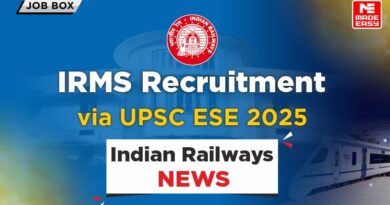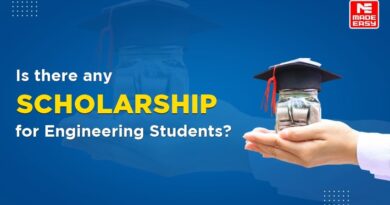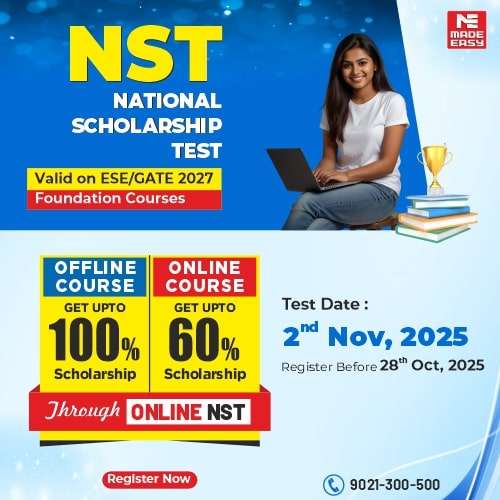What are the career options after clearing GATE/ESE?
Engineering is one of the most popular and most sought-after career options among the youths, and for good reasons. Engineering gives diverse scopes across various industries, such as cutting-edge technology or sustainable solutions. Engineers are supposed to provide solutions to real-world problems; they play an important role in shaping the future by giving the latest technology, smart building, or developing renewable energy.
The demand for skilled engineers is increasing in the private and public sectors. A professionally skilled engineer is offered a handsome salary, career growth opportunities, and a chance for innovation, which could contribute to the development. Government departments and PSUs recruit young and dynamic engineers through competitive exams that offer them a space for growth, various benefits, and a lucrative salary. Engineering graduates get attracted to several opportunities and give their best to qualify for the engineering competitive exams. Yet it isn’t as easy as it seems because these exams have intense competition and less number of vacancies. The blog will provide a brief of government engineering exams GATE and ESE, career opportunities after qualifying ESE and GATE exams, and how they are beneficial for engineering graduates.
Table of Contents
- Opportunities after GATE & ESE
- Graduate Aptitude Test in Engineering (GATE)
- Engineering Services Examination (ESE)
- Career after the GATE Exam
- Career Options after ESE
- Government jobs and vacancies for Engineers
- Is engineering a good career in India?
- What does an engineer do?
- Frequently Asked Questions (FAQs)
Opportunities after GATE & ESE
Having a credible GATE or ESE result can significantly enhance aspirants’ career prospects after successfully completing the respective exams. These exams are not just exams but the paths to various future opportunities with great prospects. Every year, millions of students appear in GATE and ESE. Both of these exams are in extreme demand. They not only open opportunities in India but also give an advantage to a person who is trying to grasp opportunities abroad.
This blog is here to provide insight to the readers about the career opportunities to enhance your engineering career after ESE or GATE. Before we proceed further, let us first know in detail what these exams are.
Graduate Aptitude Test in Engineering (GATE)
GATE is one of the highly specialized and reputed examinations conducted once a year in the month of February (usually). One of the institutes out of the Indian Institute of Science, Bengaluru, and seven branches of the Indian Institute of Technology organize this exam every year. GATE aspirants are mostly graduates and postgraduates in engineering and science. One of the reasons for the large number of applicants for the GATE Exam is that final-year students can also apply for this exam along with graduates and postgraduates. This examination is a pathway to higher studies, public sector jobs, and Junior Research Fellowships. A valid GATE score is required by the aspirants who are seeking admission to the premier institutes in India. The selected candidates receive admission to the Master’s Degree or Doctoral Degree courses in these institutes. Apart from this, various vacancies are filled in PSUs through GATE score. Read More >>
Engineering Services Examination (ESE)
ESE is the prominent exam conducted by the Union Public Services Council (UPSC) every year. Recruiting engineers from the streams of civil engineering, mechanical engineering, electronics and telecommunication engineering, and electrical engineering. After three tiers of exams, the selected candidates are posted in various ministries and departments of the Government of India, such as Railways, Telecom, Border Roads, CPWD, CWC, CPES, NHAI, Naval Armaments, IDSE, MES, Ordnance Factories, etc. The candidates selected through the Engineering Services Examination are responsible for the engineering sectors for the Government of India. The selected candidates are called civil servants and are designated as class-1 gazetted officers. The officials recruit the candidates based on the merit list of the ESE. Read More >>
Career after the GATE Exam
Now, after the brief introduction about both exams, the blog further moves to get to know the jobs after the GATE exam and how a credible GATE score has brilliant opportunities in many fields like academics, PSU jobs, and research.
Let’s explore these career options one by one.
1. Higher education after GATE
One of the reasons people appear for GATE is to pursue higher studies. A good and valid GATE score can get an aspirant admission to a Postgraduate or Doctoral programme in a reputed engineering institute. If one has a high All India Rank, then the student might easily get admitted to IISc, IITs, NITs. or other top institutes. Top engineering institutes usually take in aspirants with a good valid GATE score. Getting admission to a reputed institution can open up excellent prospects in terms of a job and package.
2. Job after GATE
Campus Placements: Getting admission in the top engineering institutes like IISC, IITs, NITs, PEC, DCE, etc. increases the probability of the aspirant securing a high-paid job in a multinational company. Companies like Google, L&T, Tata, Maruti, Cisco, and several other select engineering candidates hold a Master’s degree from these reputed institutions.
3. PSU through GATE
PSUs like BHEL, ONGC, WBSEDCL, HPCL, MDL, IOCL, BPCL, NTPC, DDA, Power Grid, etc. fill vacancies through GATE score.
GATE cut-off for PSUs is very high, and therefore one must score extremely well to receive the opportunity for PSU enrolment. So, PSU through GATE is an excellent idea for aspirants who want to achieve big things in life.
4. CSIR-Junior Research Fellowship
The Council of Scientific and Industrial Research (CSIR), India, a premier national R&D organization, is among the world’s largest publicly funded R&D organizations. Every year, CSIR takes in many junior researchers through GATE. The candidates must sit for an interview before the final admission. To be eligible for the interview, the aspirant must possess a valid and good GATE score. The number of intakes depends on the number of research projects available. The junior researchers work on live projects and get a monthly stipend.
5. Private sector jobs
In the present times, many of the private companies focus more on research and development. Therefore, they give more preference to students with a Postgraduate degree and a valid GATE score. Some private companies also recruit through GATE scores. So, in short, taking the GATE exam seriously gives you immense opportunities.
6. Foreign companies and institutes
Many foreign companies these days give extra credit to Indian candidates who have a valid GATE score. Also, many universities abroad demand a valid GATE score from Indian candidates to accept allocations to specialized postgraduate degree programs. Therefore, a high GATE score can give an aspirant a significant advantage over his or her competitors when applying to foreign companies and universities.
7. Teaching Jobs
To get a job as a teacher or professor, a postgraduate degree is compulsory these days. Many people who want a career in the teaching sector appear for GATE. They do a postgraduate degree program at a reputed institute. Therefore, an aspirant who wants to start his or her career as a professor should appear in GATE and do a post-graduation or Ph.D. from a reputed institute.
College Preferences
Based on the qualitative analysis in terms of faculty, infrastructure, research contribution, international ranking, and campus placements, the technical institutions are classified into the following categories:
Category-A
- IISC Bangalore
- IIT Mumbai
- IIT Delhi
- IIT Kanpur
- IIT Kharagpur
- IIT Chennai
- IIT Roorkee
- IIM Mumbai (formerly known as NITIE Mumbai)
Category–B
- IIT Guwahati
- IIT Hyderabad
- IIT BHU
- NIT Warangal
- NIT Trichy
- NIT Calicut
- NIT Rourkela
- NIT Allahabad
Category-C
- NIT Bhopal
- NIT Kurukshetra
- NIT Jalandhar
- NIT Nagpur
- MNIT Jaipur
- IIIT Allahabad and Gwalior
- BITS Pilani
- NSIT Delhi
Category–D
- Dhirubhai Institute of Technology Gandhinagar (Gujrat)
- Manipal Institute of Technology
- Jadavpur University
- Punjab Engineering College
- JNTU Hyderabad
- ISM Dhanbad
- ANNA University Chennai
- BIT Mesra Ranchi
- VJTI Mumbai
- Thapar University Patiala
- Jamia Millia Islamia Delhi
- NIT Hamirpur
- P University Delhi
- NIT Surat
- NIT Silchar
- MBM Jodhpur
- Osmania University Hyderabad
- MITS Gwalior
- BIT Patna
- BIT Sindri
- B Pant Engineering College U.P.
- BIET Jhansi
The students who want to pursue a Postgraduate or Doctoral degree can choose a specialization in the fields mentioned below according to their streams.
Mechanical Engineering
- Design
- Equipment or Machine Design
- Thermal Engineering
- Manufacturing Science and Engineering
- Production Engineering
- Industrial Engineering
- Material Science and Management
- Nanotechnology, Ocean Engineering, Metallurgy, and other interdisciplinary streams are also open.
Civil Engineering
- Structural Engineering
- Geotechnical Engineering
- Construction Engineering and Management
- Transportation Engineering
- Environmental Engineering
- Earthquake Engineering
- Water Resources Engineering
- Rock Engineering
- Underground Structure
Electronic Engineering
- VLSI Design Tool Technology (* Open for other streams also)
- Integrated Electronics and Circuits
- Micro Electronics, Microwave Engineering
- Communication Engineering
- Telecommunication Technology and Management
- Optoelectronics and Optical Communication
- Computer Technology
- Digital Signal Processing
- Control and Automation
Electrical Engineering
- VLSI Design (Core branch of EC)
- Integrated Electronics and Circuits (Core branch of EC)
- Power Electronics
- Machine and Drives
- Power Systems
- Telecommunication Technology and Management (Core branch of EC)
- Control and Automation
- Digital Signal Processing
- Instrumentation Technology (Core branch of IN)
- Communication Engineering (Core branch of EC)
- Computer Technology (Core branch of CS)
Computer Science and IT Engineering Priority Specialization
- Computer Science and Engineering
- VLSI Design (Core branch of EC)
- Integrated Elect. and Circuits (Core branch of EC)
- Computer Architecture
- Operating System
- Computer Security and Algorithms
- Information System
- Network and Mobile Communication
- Software Technology
- Information Technology
- Computer Applications
Career Options after ESE
The Union Public Service Commission conducts an Engineering Services Examination once a year for recruitment from streams like Civil, Mechanical, Electrical, and Electronics and Telecommunication Engineering.
The aspirants who successfully pass the Engineering Service Examination can get jobs in their respective branches as mentioned below.
Civil Engineering:
- Indian Railway Service of Engineers
- Indian Railway Stores Services
- Central Engineering Service
- Indian Defence Service of Engineers
- Indian Ordnance Factories Services
- Central Water Engineering Gr. ‘A’ Service
- Central Engineering Service (Roads) Group-A
- Assistant Executive Engineer
Mechanical Engineering:
- Indian Railway Service of Mechanical Engineers
- Indian Railway Stores Service
- Central Water Engineering Gr. ‘A’ Services
- Central Power Engineering Service
- Indian Ordnance Factories Service
- Indian Naval Armament Service
- Assistant Executive Engineer Group ‘A’ (Mech. Engg. Posts) in the corps of EME, Ministry of Defence.
- Assistant Naval Stores Officer, Grade-I (Mechanical Engineering Posts) in the Indian Navy
- Central Electrical & Mechanical Engineering Service
- Assistant Executive Engineer in Border Roads Engineering Service Group ‘A’
- Indian Supply Service, Group ‘A’ (Mechanical Engineering Posts)
- Indian Defence Service of Engineers
- Central Engineering Service (Roads) Group ‘A’
Electrical Engineering:
- Indian Railway Service of Electrical Engineers
- Indian Railway Stores Service
- Central Electrical and Mechanical Engineering Service
- Indian Naval Armament Service
- Indian Ordnance Factories Service
- Central Power Engineering Service
- Indian Defence Service of Engineers
- Assistant Naval Stores Officer, Grade-I in the Indian Navy
- Indian Supply Service Group ‘ A’
- Assistant Executive Engineer Group ‘A’ [Electrical Engineering Post] in the corps of EME, Ministry of Defence.
Electronics and Telecommunication Engineering:
- Indian Railway Service of Signal Engineers
- Indian Railway Stores Service (Telecommunication/Electronics Engineering Posts)
- Indian Naval Armament Service
- Assistant Executive Engineer Group A in the Corps of E.M.E., Ministry of Defence
- Central Power Engineering. Service, Group ‘A’ [Electronics and TeleCommunication Engg. Service]
- Engineer (GCS-Gr-‘A’) in Wireless Planning and Coordination Wing/Monitoring Organisation. (M/o Communications & I.T., D/o Telecommunications)
- Assistant Naval Stores Officer Grade in Indian Navy
- Indian Supply Service, Group ‘A’
- Indian Inspection Service Group ‘A’
- Indian Telecommunication Service Gr. ‘A’
- Junior Telecom officer [General Central Service Group ‘B’ Gazetted Non-Ministerial]
Government jobs and vacancies for Engineers
Check out the detailed video on ‘Recruitment Via GATE and ESE 2025 in CIL, BMC, GPSC, MPSC, and NTPC’. The video is all about the recent government jobs and vacancies for engineers. In addition, you will find out about the exams that will pave your way towards these amazing opportunities.
Also for latest government vacancies visit MADE EASY Job Box
Is engineering a good career in India?
In India, every student in high school wants to choose a career path that offers them respect in society. For decades, engineering has been at the top of the list. Over these decades, the field of engineering has evolved largely with the appreciation of engineering salaries in certain sectors, such as information technology. Here are some of the reasons that make engineering a good career in India.
- Appreciating growth prospects: India has several top colleges that offer excellent training to students via internships and placements. In this way, students have several opportunities to learn and work in different parts of the country. In addition, engineering students have promising opportunities in the form of jobs after clearing the UPSC exam. This offers excellent opportunities to students right from their college days, thus helping them build a bright engineering career. In this way, engineers can create a long-term career chart for themselves with a decent retirement life.
- Decent income: Highly skilled engineers prove to be an asset for the respective organizations. Therefore, if a student chooses to become an engineer, his skills will be beneficial to his long-term financial state. The engineering salary increases significantly after the engineer lands one of the opportunities after the GATE exam.
- Respect in society: Indian society has due respect for engineering professionals, influenced by the engineering salary associated with the respective jobs. This respect increases to the next level with the selection of ESE jobs.
What does an engineer do?
The work of an engineer depends on their respective role and field of engineering. Some in-demand engineers include civil engineers, mechanical engineers, electronics and communication engineers, electrical engineers, and computer science engineers. The engineering salary varies with the skill set and result received from the respective task.
- Civil engineers are responsible for designing and overseeing public works construction, which includes roads, bridges, tunnels, roads, airports, and sewage systems, to name a few.
- Mechanical engineers work towards finding out and solving the problems related to mechanical devices, engines, machines, and tools.
- Electrical engineers are primarily responsible for performing certain activities, such as designing, building, and testing the manufacturing of electrical equipment such as communication systems, electric motors, radar and navigation systems, and power generation equipment, to name a few.
- Electronics and communication engineers work on different activities associated with electronic equipment. This includes in-depth research, design, development, and ultimate testing of the electronic equipment.
Frequently Asked Questions (FAQs)
Lastly, our blog will conclude with frequently asked questions in regard to the ESE and GATE.
1. What is the salary of the candidate recruited in PSU through GATE?
Ans. The salary structure of the candidates selected through GATE in PSU jobs ranges from ₹ 50,000/- to ₹ 1,20,000/- (per month). The salary is quite competitive depending on the posts and departments, including various allowances such as Dearness Allowance (DA), House Rent Allowance (HRA), Medical Allowance, and other perks.
2. What is a good rank in GATE?
Ans. A good rank for PSUs in GATE is below 200 in every branch. Although it varies from stream to stream every year.
3. Which PSU has the highest salary?
Ans. The salary of the PSUs varies based on the profile, the location, and the organization. Companies like ONGC (Oil and Natural Gas Corporation), IOCL (Indian Oil Corporation Limited), PGCIL (Power Grid Corporation of India) etc. are known for offering some of the highest salary packages in the PSU sector.
4. Can I crack GATE without coaching?
Ans. A student having a good understanding of the subjects in GATE can easily crack the exam. Although coaching provides study material, and expert teaching faculties enhance the exam preparation.
5. Is GATE Score valid for a lifetime?
Ans. The GATE score remains valid for three years after it is issued. Additionally, the candidate has the option to retake the exam the following year if they are willing to improve their score.
6. What is the salary of a candidate qualifying ESE?
Ans. The salary of a candidate qualifying ESE in the initial stages ranges from ₹ 50,000 to ₹ 60,000 depending on the posting city of the respective officer.
7. Which post is higher in ESE?
Ans. The highest rank in ESE is managing director or chairperson.
8. Which is better pursuing higher education or a PSU job after GATE?
Ans. It entirely depends on the GATE candidate’s career goal. Higher studies is inclined towards research while jobs in PSU after GATE offer handsome salary and career growth.
We hope this blog helps you make the right career decisions after successfully clearing the GATE and/or ESE. Good luck with your journey!
Dear Aspirants,
Your preparation for GATE, ESE, PSUs, and AE/JE is now smarter than ever — thanks to the MADE EASY YouTube channel.
This is not just a channel, but a complete strategy for success, where you get toppers strategies, PYQ–GTQ discussions, current affairs updates, and important job-related information, all delivered by the country’s best teachers and industry experts.
If you also want to stay one step ahead in the race to success, subscribe to MADE EASY on YouTube and stay connected with us on social media.
MADE EASY — where preparation happens with confidence.

MADE EASY is a well-organized institute, complete in all aspects, and provides quality guidance for both written and personality tests. MADE EASY has produced top-ranked students in ESE, GATE, and various public sector exams. The publishing team regularly writes exam-related blogs based on conversations with the faculty, helping students prepare effectively for their exams.






Thanks for the valid information
Very well information… I like it
Dear Candidate,
Thanks for writing to us. We are glad to know that you liked this article. Please keep visiting our blog to get similar content.
Regards,
Team MADE EASY
Thank you
thanks a lot
Thank you so much for providing an important information.
Hope this information will play a keen role for many candidates like me.
got rank 1400, tell me the best institute and branch I can take with this rank
Dear Student,
Kindly keep on vesting our website madeeasy.in and for call us, use this no. 011-45124612.